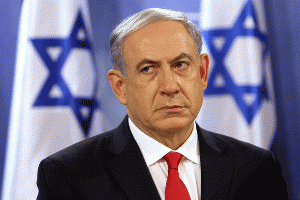Reprinted from The National
Benjamin Netanyahu's government in Tel Aviv is drafting legislation that ought to resolve in observers' minds the question of whether Israel is the democracy it proudly claims to be. The bill empowers a three-quarters majority of the Israeli parliament to oust a sitting MP.
It breathes new life into the phrase "tyranny of the majority." But in this case, the majority will be Jewish MPs oppressing their Palestinian colleagues.
Mr Netanyahu has presented the bill as a necessary response to the recent actions of three MPs from the Balad faction of the Joint List, a coalition of parties representing the often-overlooked fifth of Israel's citizens who are Palestinian.
He claims the MPs "sided with terror" this month when they visited Palestinian families in occupied East Jerusalem who have been waiting many months for Israel to return their relatives' bodies.
The 11 dead are among those alleged to have carried out what are termed "lone-wolf" attacks, part of a recent wave of Palestinian unrest. Fearful of more protests, Israel has demanded that the families bury the bodies in secret, without autopsies, and in plots outside Jerusalem.
There is an urgent moral and political issue about Israel using bodies as bargaining chips to encourage Palestinian obedience towards its illegal occupation. The three Palestinian MPs also believe they are under an obligation to help the families by adding to the pressure on Mr Netanyahu to return the bodies.
Israel's Palestinian minority has a severely degraded form of citizenship, but it enjoys more rights than Palestinians living under occupation.
When a video of the meeting was posted online, however, the Israeli right seized the chance to attack and disenfranchise the MPs. A parliamentary "ethics" committee comprising the main Jewish parties suspended the three MPs for several months. Now they face losing their seats.
This is part of a clear trend. Late last year, the government outlawed the northern Islamic Movement, a popular extra-parliamentary political, religious and welfare organization.
Despite Mr Netanyahu's statements that the movement was linked to "terror," leaks to the Israeli media showed his intelligence chiefs had advised him weeks before the ban that there was no evidence to support such accusations.
At the time many Palestinians in Israel suspected Mr Netanyahu would soon turn his sights on the Palestinian parties in the parliament. And so he has.
Balad, which decries Israel's status as a Jewish state and noisily campaigns for democratic reform, was always likely to be [at the] top of his list. In every recent general election, an election committee dominated by the Jewish parties has banned Balad or its leaders from standing, only to see the Israeli courts reverse the decision.
Now Mr Netanyahu is legislating the expulsion of Balad and throwing down the gauntlet to the courts.
It won't end there. If Balad is unseated, the participation of the other Joint List factions will be untenable. In effect, the Israeli right is seeking to ethnically cleanse the parliament.
For those who doubt such intentions, consider that two years ago the government raised the electoral threshold for entry to the parliament specifically to exclude the Palestinian factions.
(Note: You can view every article as one long page if you sign up as an Advocate Member, or higher).






